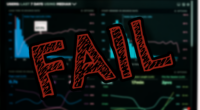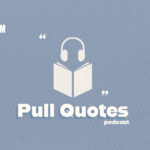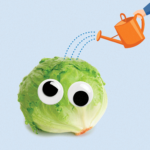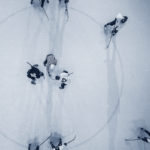[Intro music plays]
Carly Penrose: Lit by clinical overhead lights. Hockey Canada president and CEO Scott Smith is flanked by an attorney to his right, and his colleague Brian Cairo to his left. Leaders of Hockey Canada and its members sit at the long wooden table. It is an image of uniformity. Seven white men, several with grey hair, wearing suits in varying shades of navy blue and black. Seven glasses of water sweat before them, as they face a room of members of parliament, eager to question them about a Statement of Claim Filed in a court in London, Ontario.
Tara De Boer: That was the voice of Carly Penrose, reading an excerpt from her story “Cultures of Abuse,” which covers how sports journalists reported on the Hockey Canada sexual assault scandal that’s been unravelling this past year. The hockey world was rocked in May of 2022, when news broke that Hockey Canada had silently settled a disturbing sexual assault case against eight of the 2018 Canadian hockey league players.
Silas Le Blanc: When the news broke, the organization was put under fire for the ways in which they handled the horrendous events leading to the loss of sponsorships, and eventually, the stepping down of hockey Canada’s board members. While hockey is integral to the identity of many Canadians, this news put that identity into question and sparked discussions of power, privilege and ethics. All aspects Carly investigates in her story. Today, Tara speaks with Carly to talk about what it was like interviewing the sports journalist who broke the story, the challenges she faced covering such a sensitive subject matter, and how she navigated writing a still-unfolding story.
[Pull Quotes theme music plays]
TD: Welcome back to the sixth season of pull quotes. We’re your hosts, Tara De Boer, Tim Cooke and Silas Le Blanc.
TD: Hi, Carly, welcome to pull quotes. How’s it going?
CP: It’s good. How are you?
TD: I’m great. I’m super excited to speak with you today all about your story, which you spent a number of months working on. So first, I just want to start, let’s hear about to you to give our listeners a little bit of a feel of who you are and what your journalistic interests are.
CP: I like journalism, I wasn’t really sure what I wanted to do when I went into it, though. As I’ve done this degree, I found that I really liked the creative element of like writing stories, but I also think that there’s a lot of value–as we’ll probably talk about–in the work being done by investigative journalists and I think that that’s where my main interests lie at the end of these two years. I think investigative is like a very interesting and important avenue. And I’d like to look into that some more for myself.
TD: Okay, so you covered a very big investigative story this past year, so that’s fitting. The Hockey Canada sexual assault story. So, I’m curious what led you to cover this? And was there any hesitation in covering such a heavy topic.
CP: So, I grew up in a hockey family, my whole family was really into hockey, we played street hockey every morning before going to school, and we lived very close to the school. So, the bell would ring and we’d like drop our sticks and run to school, for our parents to pick up. So it’s always held interest. I think particularly like the Olympics and the World Juniors were a big thing in our household. So I think that was part of it. Another part of it was just sort of this understanding about things that maybe had frustrated me about sports for a while, that a lot of people talked about scores and what happened in the games, but like, there’s clearly more going on in sports. And I wasn’t really seeing that in journalism until a couple years ago, things shifted. And so I wanted to see, originally, my idea was like, ‘are sports journalists, equipped and prepared to deal with heavy subject matter like sexual assault?’ And it became clear to me that a lot of them were, and they were very careful in the work that they were doing. So, I just kind of wanted to highlight that, which also made it easier, I found, when I was writing it because I was looking at the people who were making a difference. I wasn’t so much engaging with like the really dark side of things. I was engaging with the people that were working really hard to help find solutions. And I think that that’s what made it easier for me, at least, to report it and to have those conversations with the journalists who are doing that work.
TD: So, what was it like getting these journalists to talk to you? Was that an easy process off the bat?
CP: Yes. A lot of people were eager to talk about this was still happening. My editor who was kind of like hands on and helped me with the process is a sports editor at the Globe and Mail, Jamie. And he was very awesome and very helpful. He sort of helped me out with getting in touch with his colleague, Grant Robertson, who was a huge source for me. I remember being very nervous to email Rick Westhead, because he was everywhere at the time, but I emailed him. He answered me and like 15 minutes, he gave me his phone number, so I could text him because he was coming to Balzac’s the next day, and so I just like met him at a cafe.
TD: That’s amazing.
CP: Yeah.
TD: Rick Westhead being the man who broke the Hockey Canada scandal story.
[NEWS CLIP of a news anchor interviewing Westhead]
CP: Super easy. Katie Strang emailed me back pretty quickly. It took a while to schedule the interview, but she emailed me back. Laura Robertson, Robinson, too, rather and Grant Robertson as well. So, everyone was really eager to talk about it and talk about sort of some of the good work that was being done because a lot of the stories were heavy and hard. And they were eager to sort of like, get their work out there and make sure that this story was known, and appropriately and accurately.
TD: That’s good to know. Yeah, because it definitely sparked as interesting to me, that this topic for sports journalists were it’s kind of this grappling with hockey and Canadian identity. And this really bad thing would be difficult to talk about. But it sounds like it was more of them wanting to talk to do it justice and to get the facts right. So that’s great for you.
CP: [Laughs] Yeah.
TD: And for the purpose of the story, it’s awesome. You’ve been covering this, or you were covering this, at a time while the story was still unfolding. So, what was it like following it while reporting on it, and grappling with all these updates?
CP: The editing process was kind of funny, because I’d hand it to my handling editor and then one day later, I’d email him and be like, ‘okay, I realize that that’s not true anymore, but I will change it in the next draft.’ I definitely… when Scott Smith, the President and CEO of Hockey Canada stepped down.
[NEWS CLIP about Smith stepping down]
CP: That was a moment where I was like, should I change the entire intro to my story, which people just heard, which was like about him, and he’s not there anymore? And does that matter? Again, Jamie was very helpful. And he was like, well, this is still true of what was happening at the time. And it still sort of represents that moment in history, I guess. I don’t know if that’s the right word. But it was a bit challenging sometimes to stay ahead of where it was going to go. But for the most part, I think it was helpful. Yeah.
TD: Were there any details you chose not to include?
CP: Unfortunately, there was quite a few details I chose not to include, like a lot of people have very interesting stories about how they got their starts. Laura Robert- Robinson in particular, she made some really interesting points because she is one of the journalists who has been covering sexual abuse and sexual harassment and mistreatment of athletes and sport for years and years. She worked with CBC on the Fifth Estate like 30 odd years ago. And she has been breaking stories and hearing accounts from people for as many years too. And something about this story that was interesting was that it was Rick Westhead, who broke it and then it exploded. But she has kind of been writing about this consistently throughout. Not this specific case, obviously, but different cases of junior hockey players or WHL hockey players that were charged with sexual abuse. And so, she mentioned to me in the interview, that there’s definitely some element of the fact that she was a woman writing about these stories. And she was viewed as like a woman with an axe to grind or like a vendetta against these boys clubs in sports. And so, when Rick Westhead broke the story, he is an incredible journalist, and she said as much. She said, he’s done amazing work and he’s a great journalist, but he’s also a white man. And so people who love hockey in this country are conditioned to be more likely to listen to the things that he has to say, which might change sort of the way we look at sports. That is a really important thing, but I didn’t really have time to engage with that in the word count that I had. But I really think that was an important point that I don’t know if I wish I included it. I think it would have been its own story. If I could have but yeah.
TD: Yeah, and you do touch on that a little bit. But… and I do want to ask you about Rick Westhead, because he was the main character driving the story. Of course, he played such an integral role and the breaking of this news. But on Laura Robinson on that point about women in this space and doing the work she has been doing, do you feel that it was too late in the game? And if you could, would you go back and make her your main character of the story? I think that would probably reshape, you know, the focus of the story a bit, but.
CP: Yeah, I mean, I don’t know if I would for this story, just because it was so specifically about this one case of the world junior team from 2018. So, I think I could write a whole new story with her as the main character. And that would be very interesting to me, and I would be interested to do that. But for this story, I think this might have been the right choice. Personally.
TD: Perhaps a part two is coming soon. [laughs] look out for it. Okay, so I do want to ask about Rick Westhead because you touched on how you met up with him at a Balzac’s, and it sounds very casual, but like his name is what pops up when you Google this. So, what was it like interviewing the man who broke the news and how did that shape your story?
CP: I was very nervous. The last couple years being dominated by COVID-19 while we were starting journalism school, it was actually the first in-person interview I’d ever done, like all the other ones had been on Zoom or on the phone and so that like heightened my nerves. And then the fact that he was like such a big name also heightened my nerves, but he was very casual. He came up with like little backpack and talking to me, just like cracking jokes. Something I included my story but got edited out, which I’m still a little sad about is I had interviewed Shireen Ahmed, who is an amazing sports journalist herself and she told me that Rick Westhead and Katie Strang are like the “Federer and Nadal of investigative sports journalism,” like they’re good friends, but they’re also rivals and they’re competitive but they also love each other and respect each other.
[CLIP of tennis players Roger Federer and Rafael Nadal bantering]
CP: So I told him that, and the first thing he told me it was that nah, I’d say we’re more like the Statler and Waldorf. Which, like, I don’t know, is a reference that a lot of people would get. But it’s like those two old man Muppets that are like, just trashing all of the Muppets during the show. Like being grumpy and old, like buddies.
[CLIP of Statler and Waldorf]
CP: And that, sort of, was nice because it’s it kind of disarmed me a little bit. And I was like, Oh, he’s just like, very casual. He’s also able to compartmentalize in a way that I don’t think I personally would be able to, or a lot of people are able to. So it was quite an easy conversation. It was also helped by the fact that Shireen saw us at Balzac’s and started chatting, and we had a good conversation with her, too. So, I think there’s just like, multiple good, casual like joking-around interactions that we had that sort of just made it easier to have that interview.
TD: Did he tell you anything that really still surprises you to this day?
CP: I remember asking him about one of the Hockey Canada hearings, Scott Smith said, we found out from Rick Westhead about this information. So, I asked him about that. And he was like, ‘Yeah, I had no idea they were going to say that, like I sent them an email a day before, got no response. And so they just like you mentioned me at Parliament.’ And he was like, ‘okay, I’m kind of part of this now.’ And just because he’s on top of that information, which I found very interesting.
TD: So, you spoke with a number of sports journalists. And something that I was thinking about while reading your story was, how do these sports journalists maintain these professional relationships with athletes and coaches and people they rely on for stories and for their work? Like, do you want to have a good relationship, while also exposing these wrongdoings? Did you get into that at all with any of your sources?
CP: I think I went in a little more judgmental than I should have been, in that I was kind of going in with the “I’m critical of all the people that just share scores. And I am supportive of all the people that are telling these other stories.” And I was talking with sports journalists like Rick Westhead and Katie Strang who, like, do investigative journalism. And all of them were pretty clear that those people are very important, like, people want to know the scores, and that’s fine, but there has to be both. And I think that that’s sort of something I came away with. I did talk to one journalist who he did not end up in the story, but he works in Vancouver and he covers the Canucks and he is an interesting case, and then he’s one of the few journalists that both covers scores and trades and stuff for the Canucks. But he also covers like the court cases. And I asked him if he was worried about his access. And he just said, like, “no,” which is super good for him. But I also know that that’s not going to be the case for a lot of people. And Morgan Campbell was very cool when I talked with him and he was saying that like, there are people who are really good at what they do, in, like, getting scoops. The small scoops of like “so and so is being traded to another team,” but that the work that he does is more about the people that these athletes are off the field. That means he’s not going to be able to go into the locker rooms like some of his colleagues would. But they’re all still very interesting stories. And there’s a place for both. It’s just that the people who are really good at the incremental scoops aren’t going to be the same people that are really good at telling these deep contextualized stories about racism in high school basketball or something like that.
TD: That’s interesting, though, because does that mean that those people who aren’t going into those areas, are they just ignoring all that’s going on? Or is it just their job to focus on the game score?
CP: Yeah, I mean, that’s the question. I’ve had a lot of conversations with people that say that sports journalists are just “fans with typewriters.” Which like, fair enough, it’s valid. And on one of the journalists, I talked with Patrick Johnson, he said, like, there are a lot of people who get into this just so they can stand next to athletes, because like athletes are built up to be these, like, heroes. So there might be an element of that. But at the same time, I don’t think it’s fair to discount what some people are doing. Like they don’t have the time or the resources maybe to, like, deeply investigate something. And these shows need content, and people care about sports. Like it creates community for a lot of people. And so, sports aren’t just frivolous, like they’re a way for people to communicate with each other. If you care about a team, like it can create community and kinship. So yeah, I think there’s space for both. And like maybe people in their work might not acknowledge every single thing, but you also can’t do everything all the time, too.
TD: I’m curious, maybe this was a topic of conversation in your interviews, or maybe you’re you’ve thought about it. But how do you think this scandal news item has changed people’s perspective and idea about Canadian identity in hockey?
CP: It’s interesting. Watching the World Juniors this year was a weird experience for me,
[CLIP from 2023 World Junior tournament]
CP: It sort of changed my view. And I remember Rick saying, I think it was at an event, Rick Westhead. He said that. Right now, he really loves baseball, because it’s the only sport that he is not actively investigating right now. So sometimes it does make it harder to enjoy something. Something I was interested in is the fact that so many people in Canada love hockey, I thought maybe it might make people more likely to dismiss the story rather than pay attention to it. That doesn’t appear to have been the case. But I was I had a worry that that might be true. That said, like, there was still a lot of energy around the World Juniors and these boys are still in Laura Robinson’s words, treated like “young gods.” And so they’re worshipped by so many people. And they’re between like 16 and 18 years old. So, I think in some ways, things have changed, and others, things really have not changed at all. Like if victims come forward, I think people are more likely to at least hear them out or listen to them. But I don’t think it’s changed sort of the way we approach hockey, which is a more larger systemic change that needs to occur so that these young teenagers don’t feel like they can get what they want, because they were treated that way by the country who watches hockey.
TD: So, it definitely feels like we’re in this time of change. I mean, this is fresh news, like it happened less than a year ago. So did you get any tips or ideas from your conversations? Or your research about where we might be headed as a hockey culture in Canada? It’s a big question.
CP: Yeah. I think something I found interesting, which, from my perspective as a naive journalist, having only been like, really doing it for two years, my first gut instinct is like, ‘oh, I want the work I do to make a change.’ And Katie Strang has said at an event and to me like, as a journalist, it’s important not to be outcome determinative. Like you want people to feel heard, but like, you can have no idea what actual impact your work is going to have. So, I don’t think there was much let’s say, prediction about how the next few months are going to go. Rick told me early on that he had a worry that this would kind of blow over. I remember early in my story, I was talking with Laura and she said that she had faith in the OSIC, which is the new Sport Integrity Commissioner that everyone had to sign on to, to ensure safety in sports. And by the time the fact-checking call came around, she had lost faith. So, things happened in the intervening months that maybe have changed the likelihood of accountability. I mean, the board all stepped down, and they’re still in the process of finding a new one. So, I think that that’s sort of an interesting area of where it’s going to go, like who they decide to appoint. There’s been talked about people, but I don’t think it’s been fully fleshed out yet. So that’s some interesting ways to go. As far as like individual people, I mean, I live in Halifax, Halifax is home. So, during the break, when the World Juniors was happening in Halifax, it was quite an experience. So, there is a lot of energy around that still, I don’t want to take that away from people, like people enjoy it and love it, I tell a story in my feature about how after the golden goal the 2010 Olympics in Vancouver.
[CLIP from the golden goal in the 2010 Olympics]
CP: We lived on a street with a ton of kids. And so that goal was scored and we all just like ran out into the street like without any coats on and just started playing road hockey in celebration. So like, I think that that’s a really important thing. And clearly it was a formative memory for me, because I still think about it like 14 years later. Yeah, I don’t know where we’re going to go. I hope we just approach things with a little bit more measure. And we also, I think, changing within hockey, things like locker room talk, or hazing on teams or things like that, I think are really important to sort of address as a first step.
TD: Address through journalism?
CP: Through journalism, through pointing out when those things happen. So, like making it clear, like which teams do that. And… I don’t know, shame is not the right word, but like, make public sort of the inappropriate behaviours of some groups or some adults that encourage like the hazing kind of behaviour that can sometimes border on sexual harassment itself among teammates, so and realize that bonding does not only have to happen through like awful, mean shared experiences, it can happen through like positive experiences, too.
TD: Absolutely. Okay, Carly. So, what do you hope people get out of reading your amazing piece that will be out very soon.
CP: I hope people get that investigative journalism is super important that sports is an area of investigative journalism that people dabble in it, but I think there’s a lot of stories off the field to be told. One of the people I was speaking with and one of my interviews, Morgan, he was saying that as time goes on, and as sports betting becomes legalized, slowly that money that was the encouraging change that I was seeing, and that I was taking away from my piece, this pot of money is becoming smaller and smaller as more resources are devoted to sports betting. So, I think that that’s something to like, these stories are important and people who, admittedly, like myself, don’t always engage with sports journalism necessarily, found a place and like an interest in it because it was more human. Because I like watching sports, but I don’t really watch sports recap shows very often. But this was a kind of sports journalism that I was really invested in and interested in, and like, the work that Rick is doing now with the women’s soccer team, the team Canada, like those are all really important and interesting stories that I find myself more invested in and I think that they’re very valuable. And I hope that that sort of helps get that message across that like this stuff can be very valuable.
TD: What work is Rick doing with women’s soccer team?
CP: Their fight for equal pay with the men’s soccer team because of the inadequate level of pay that they’re getting compared to the men’s team who just went to the World Cup, whereas the Canadian team has won gold medals in the Olympics, and the men have not. And sort of the lack of energy around making sure that pay equity is a focus, and all the different sports teams that sort of are rallying behind the Canadian team is really cool to see
TD: Well it sounds like Rick is doing a lot of work in this space, which is awesome. And it sounds like, I mean, sports and investigative journalism is kind of like a hotbed right now that we need to really dive into. So I’m, it’s awesome that you covered this story. You also mentioned sports betting which shameless plug another student, actually a co-host of this podcast, Silas Le Blanc, covers sports betting in her Review of Journalism story. So, I’m looking forward to all these sports stories coming out. Thanks so much for joining us, Carly. So great to speak with you.
CP: Yeah. Thanks for having me. This was fun.
SL: Thanks for joining us for this episode of pull quotes. We’re your hosts, Silas LeBlanc, Tara De Boer and Tim Cooke. Big thanks to our producer, Angela Glover, executive producer, Sonya Fatah and our fact-checker, Stephanie Davoli. We’ll see you next time.












